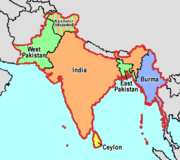The Radcliffe Line became the border between India and Pakistan on 17 August 1947 after the Partition of India. The line was decided by the Border Commissions chaired by Sir Cyril Radcliffe, who was to divide equitably 175,000 square miles (450,000 km2) of territory with 88 million people. |
The Durand Line refers to the border between Afghanistan and Pakistan, which is poorly marked and approximately 2,640 kilometers (1,610 miles) long. It was established after the 1893 Durand Line Agreement between the Government of colonial British India (Pakistan was part of the British Indian empire) and Afghan Amir Abdur Rahman Khan for fixing the limit of their respective spheres of influence. It is named afterHenry Mortimer Durand, the Foreign Secretary of British India at the time. |
The McMahon Line is a line agreed to by Great Britain and Tibet as part of Simla Accord, a treaty signed in 1914. Although its legal status is disputed, it is the effective boundary between China and India. |
The Curzon Line was a demarcation line between the Second Polish Republic and Bolshevik Russia, first proposed on December 8, 1919 at the Allied Supreme Council declaration. |
The Maginot Line , named after French Minister of Defense André Maginot, was a line of concrete fortifications, tank obstacles, artillery casemates, machine gun posts, and other defenses, which France constructed along its borders with Germany and Italy, in the light of experience from World War I, and in the run-up to World War II. Generally the term describes only the defenses facing Germany, while the term Alpine Line is used for the Franco-Italian defenses. |
  |
